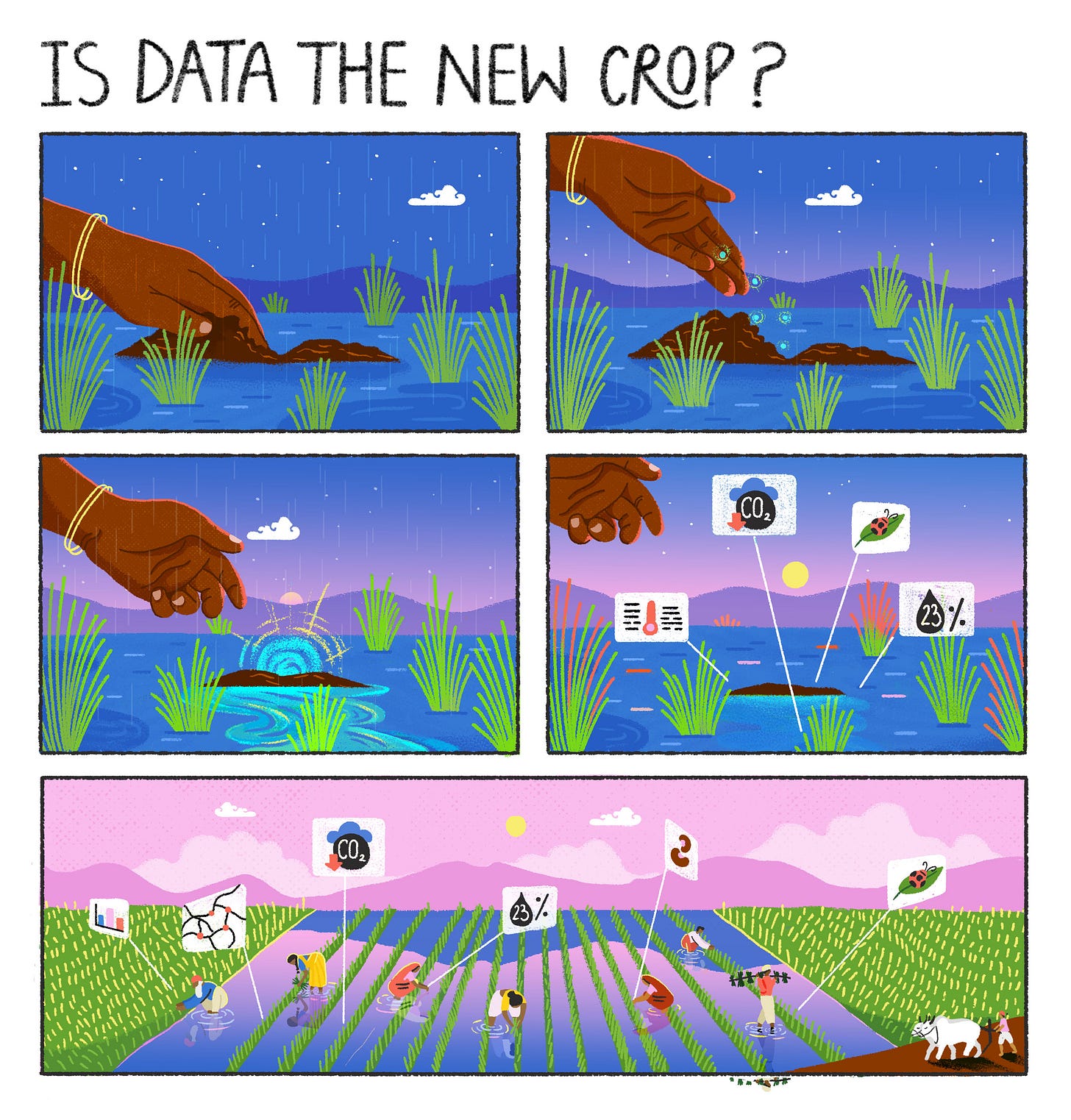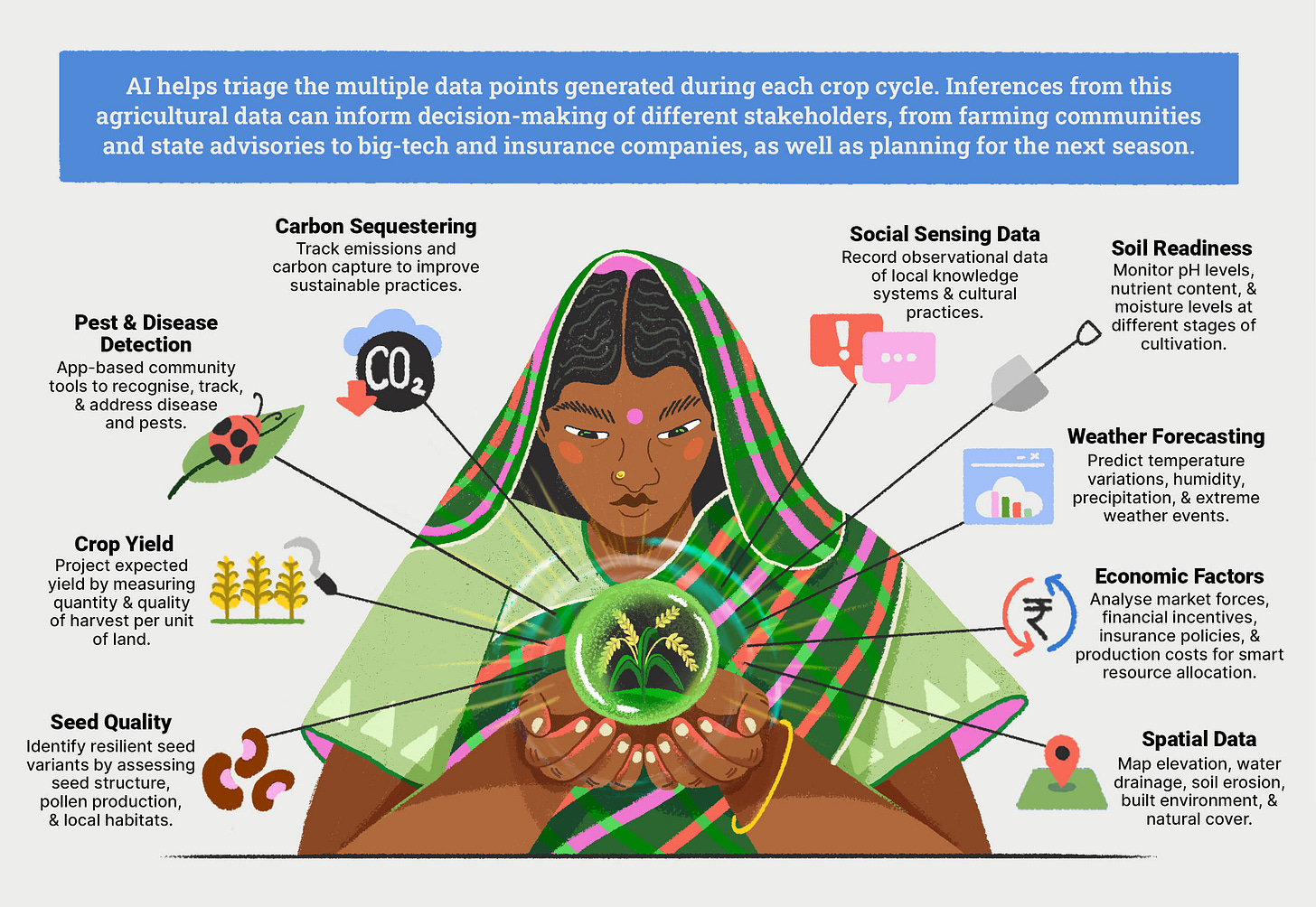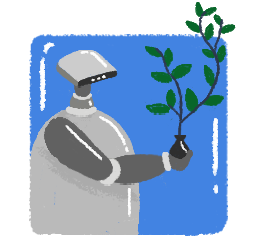Issue 02: Where Data Meets the Dirt
AI for Agriculture
Dear Reader,
Is data the new crop? It’s a question we found ourselves faced with while digging into the tensions of embedding AI in agricultural practices. In the latest episode of the Code Green Podcast, we asked Elenita ‘Neth’ Daño and Anubha Singh for their thoughts on it which led to a discussion on whether farmers are the ones who really benefit from the cultivation of agricultural data.
“I think it's unfair to crops to be used as the analogy of how this works because everything from the seed to the benefits is antithetical to what crops mean in agriculture,” says Neth. “In real agriculture that involves labour, that involves contribution of everyone in the communities and recognising that contribution, everyone knows where the ‘data’ comes from, how it is used, how it is harvested, who benefited.”
The full episode on AI & The Future of Asia’s Farmers is out now.
Amidst disruptions to traditional farming practices due to extreme weather events and the spread of pests & disease, AI is emerging as a potential solution for climate-resilient agriculture, with applications ranging from AI for precision farming and early warning systems to AI-powered chatbots for farmers.
The 350 million smallholder farmers in Asia stand to lose the most to climate change. Fluctuating yields, economic losses, and myriad health impacts are just some of the risks they face.
There are concerns that innovations in precision agriculture and farm automation are not suited for small landholders, and adoption challenges may go unaddressed without parallel investment in farmer training, financial support, and community consultation.
On the one hand, agri-tech innovations have the potential to empower farmers by improving market access and data-informed decision-making. Agricultural data can be used to build models focussed on regenerative agriculture while providing critical data for policymakers.
On the other hand, the trend of corporate-state partnerships seen in agri-tech innovation may lead to the monopolisation of digitised agricultural value chains while the privatisation of public extension services may create information asymmetry through unfair data extraction.
Curated Reads
In this issue, we explore: What is the tech optimised for? How does it incorporate local traditional knowledge systems? What are farmers' perceptions of technology? How to design and develop AI for Agriculture that protects farmers’ autonomy and leads to better outcomes for agriculture?
Integrating local knowledge systems & scientific data for weather forecasting
Farming practises everywhere rely on the ability to read the land and weather, traditionally taking cues from seasonal patterns of birds, insects, flowering plants, cloud movements, and other changes in local landscapes to make predictions. How can this keen understanding of ecology be integrated with data-driven technologies like AI?
A recent study in Bangladesh, Guatemala, and Ghana tapped into generations of accumulated knowledge and practical farming experience to co-create a hybrid weather forecasting system that improved the legitimacy of weather forecasting services and produced tailored and actionable insights for farms. Farmers participated by using an app to enter their daily predictions based on ecological indicators and their study of their surroundings. This user-driven data generated was integrated with scientific forecasts from local meteorological services to increase the accuracy of weather forecasts (credibility), while at the same time ensuring context-relevance (salience) and user ownership and trust between stakeholders (legitimacy).
Smart Agriculture in the Phillippines: Use cases, challenges, and limitations
Expert commentary from our AI + Climate Futures work notes that smart agriculture is gaining momentum in The Philippines to combat climate change, guided by the Agriculture 4.0 agenda, which promotes digitalisation through technologies like drones, blockchain, and data analytics. Public-private partnerships with foreign governments, transnational corporations, and agri-tech startups are picking up pace. Technologies like sensors, drones, and smartphone applications assess pest infestations in major crops, while digital tools like the Philippine Rice Information System (PRiSM) are being integrated into government programs. The government is also digitalising farmland data through the Enhanced Farmland Geographic Information System (eFGIS).
However, no independent studies assess the impact of AI and digital tools on productivity for climate action. The expert-author highlights key concerns, which ring true for similar economies in the region, such as financial burdens on small-scale farmers, data ownership, and the environmental impact of digital tools. Moreover, these tools do not address practices contributing to the climate crisis - like the continued use of chemical fertilisers affecting soil and groundwater. Given Asia’s context of majority smallholder and subsistence farmers, the author argues that infrastructure and extension services are critical to making AI-based solutions accessible to marginalised farmers.
Technology for farmers, with farmers
Given the economic costs of adoption and digital capacity requirements, what motivates farmers to adopt advanced technologies like AI? For Nepal’s small-scale farmers, researchers found that factors such as perceived usefulness and ease of use as well as social factors such as technology anxiety shape farmer attitudes towards technology adoption. They emphasise the importance of government support for farmers through training and subsidies to increase trust and confidence.
In technology development cycles, it is crucial to engage with farmers from early stages. In a study with Australian farmers, researchers argue that factors such as transparency and clarity regarding data ownership, portability, privacy, trust and liability in commercial relationships, contribute to farmers’ reluctance to engage in the widespread sharing of their farm data. Top-down approaches by agribusinesses may constrain farmer autonomy by targeting smallholder farmers as consumers rather than as primary stakeholders. Methods such as choice architecture and behavioural nudging are used to shape farmer behaviour in a way that generates and distributes value and information asymmetrically, creating dependencies and lock-ins.
However, participatory bottom-up approaches can also be hard to navigate. In a study of a failed participatory technology development initiative for assessing soil fertility, researchers found that in the Japanese context, cultural norms that emphasise politeness, modesty, and respect and factors like gender and status influence stakeholder engagement in discussion forums. In this case, as farmers’ perceptions of the technology’s usefulness wavered, so did their engagement with researchers. The authors suggest that self-evaluation models are crucial to enabling participatory formats to address discrepancies in interpretations of the usefulness of technology interventions.
Creating trustworthy AI for Agriculture applications
A farming ecosystem is a complex web of relationships between people, technologies, and the environment. In addition to stakeholder engagement, a thorough risk assessment and mitigation of systemic risks, such as data issues and unintended consequences, is important to responsibly deploy AI in agriculture. The authors of this paper propose a social-technological-environmental system (STES) framework for Responsible AI design to mitigate negative impacts on farmers’ decision-making, asking questions around the core functions of the application and attributes at risk.
But who is responsible for implementing these frameworks? Scholars at UC Davis interviewed researchers of the Artificial Intelligence Institute for Food Systems in the US and found misalignments and conflicts between standards, ethical principles, and interests of researchers, funders, and food system partners. For example, funding agencies' transparency mandates could deter potential partners from sharing data, reducing collaboration and limiting data diversity for researchers.
In the absence of clear guidelines, and when there is such a mismatch of interests, it is the researchers who must personally build trust with stakeholders. They do this by “(1) presenting AI technologies as an aid, not just a displacement of human labour and decision-making; (2) privacy of the data with which they are entrusted, (3) reliability and accuracy in the algorithms they use the data to produce; and (4) building long-term relationships of mutual trust.”
Around the Web
Our World in Data looks at land use, food production, and crop yield over the years through interactive maps.
Saukaash Jaa, a NatGeo-funded multimedia project explores the worries of the rice-growing farmers of Ratnagiri over the increasingly erratic southwest monsoons.
Farm Hack is an open-source platform run by a global network of farmers for building, fixing, and tinkering with their own tools.
Grow Asia’s Digital Directory is a collaborative effort to make information, finance, and market solutions accessible to investors, agribusinesses, and smallholder farmers.
Dive into the fascinating world of Seed Banks and their role in climate resilience and averting a food crisis.
As we look to the future of farming, Anubha Singh reminds us that the ‘fail fast’ approaches we currently see in the agri-tech startup landscape may be doing more harm than good for farmers:
Anubha: “Because I think one of the biggest harms these technologies do– and in these incubators as well, where I did my fieldwork, a lot of these startups were taught, ‘oh fail fast, design a prototype, test it out in the field, fail fast’. I think that ends up doing a lot of harm in real-world situations, like in agriculture, farmers end up losing their income for the whole season. And then, it accrues this entire cycle of debt and all of those things.”
Credits
Research & Curation: Dona Mathew, Meredith Stinger, Tammanna Aurora | Illustrations: Nayantara Surendranath | Art Direction: Tammanna Aurora | Layout Design & Communications: Shivranjana Rathore | Editorial: Urvashi Aneja
We'd love to hear from you as we work on our next issue on Geospatial AI for climate action - do write to us with your research and recommendations at codegreen@digitalfutureslab.in






